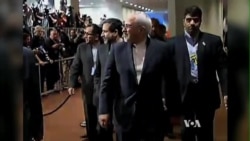Secretary of State John Kerry’s efforts to resolve Iran’s nuclear crisis are continuing into 2015 after Iran and six world powers failed to agree by a November deadline.
U.S. domestic politics, however, could complicate efforts to reach a deal in the new year.
While Secretary of State John Kerry sounded an optimistic note in his first official meeting with Iranian Foreign Minister Mohammad Javad Zarif in September of 2013, Tehran's top diplomat questioned whether the ideas could be put into action.
“Now we have to see whether we can match our positive words with deeds so that we can move forward,” Zarif said at the time.
Since then, the two diplomats have met numerous times as negotiators for Iran and the five permanent members of the U.N. Security Council plus Germany work toward a deal limiting Iran’s nuclear enrichment activity.
Iran says its nuclear goals are peaceful. Some Western powers fear Iran wants to make nuclear weapons.
An agreement would give Iran relief from crippling sanctions.
After a series of meetings between January and June, though, negotiators extended talks to November 24, only to follow with another extension.
“These talks are not going to get easier just because we extend them. They have been tough. And they are going to stay tough,” said Kerry.
Zarif indicates there is a key stumbling block. “The major obstacle was that there is a compounded mistrust, mutual,” he recently said.
While negotiators now hope to reach a deal by July, their efforts may be complicated by a sea-change in the political make-up of the U.S. Congress. The new Republican-controlled Senate may be less inclined to lift sanctions immediately if there is a nuclear agreement, says analyst Robert Einhorn of the Washington-based Brookings Institution.
“The Obama administration believes that, with the new Congress that will be seated in January, it can’t go to them right away and ask for a vote to lift sanctions," he said. "They believe that the case will be much stronger later on, if and when the IAEA [nuclear watchdog] reaches a conclusion that Iran is in compliance.”
He also said lawmakers may become frustrated if negotiations drag on. “Members of Congress are anxious to impose additional sanctions," he said. "That could have a disruptive effect.”
Kerry says while negotiators still have “significant points of disagreement,” they do believe that a comprehensive deal that addresses concern about Iran’s nuclear program is still possible.











